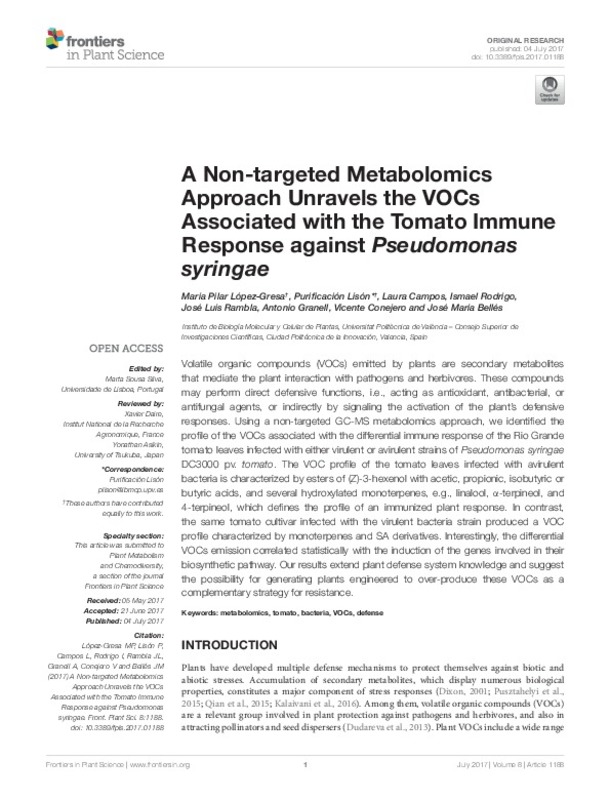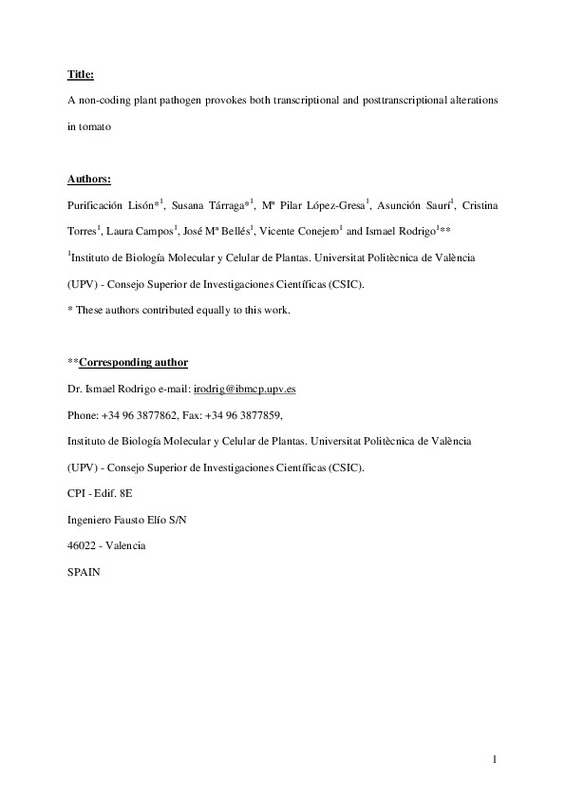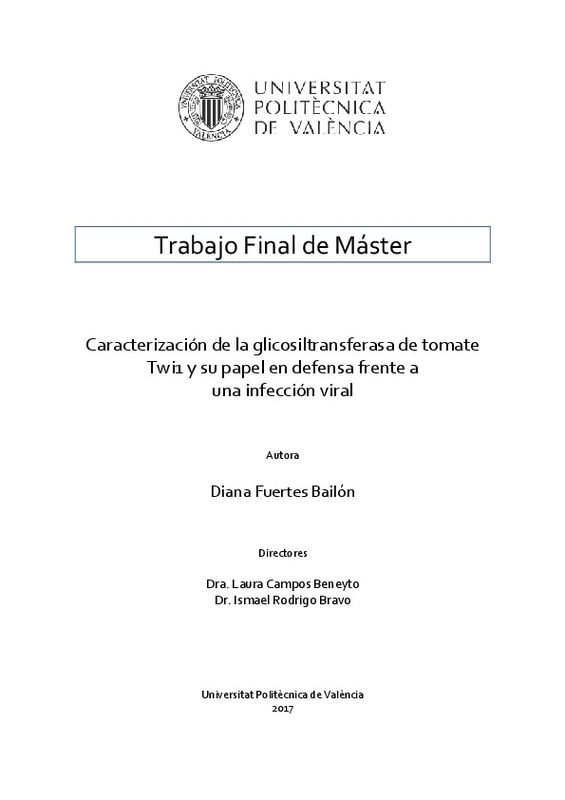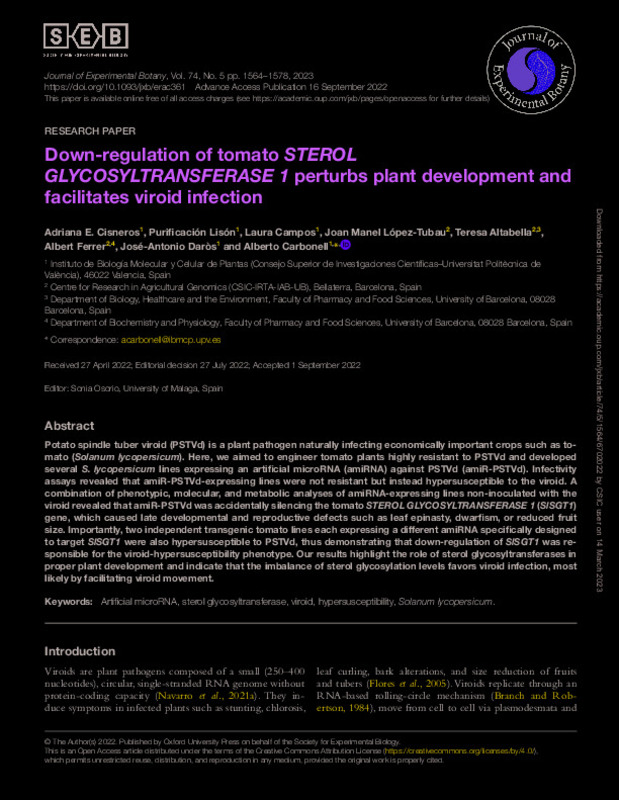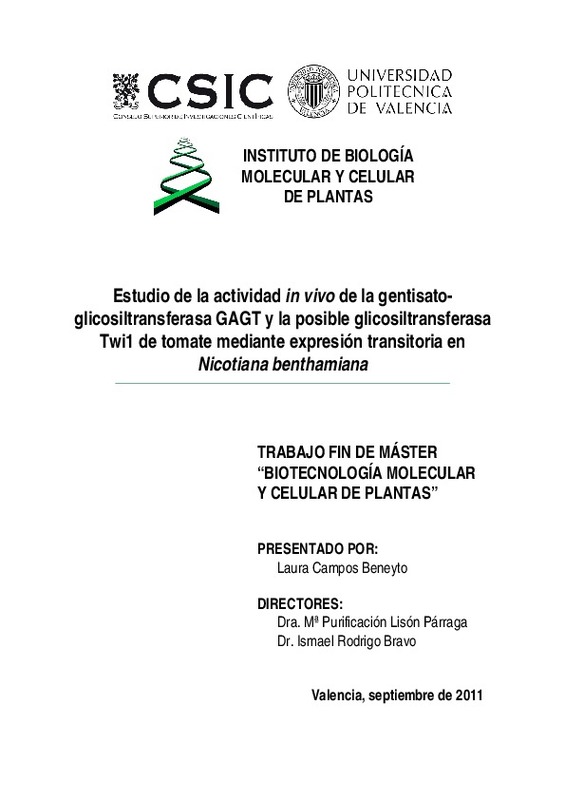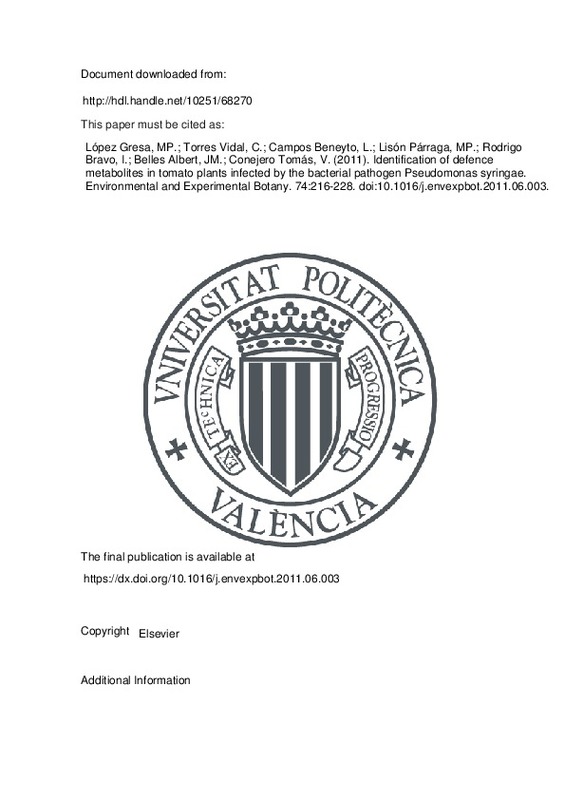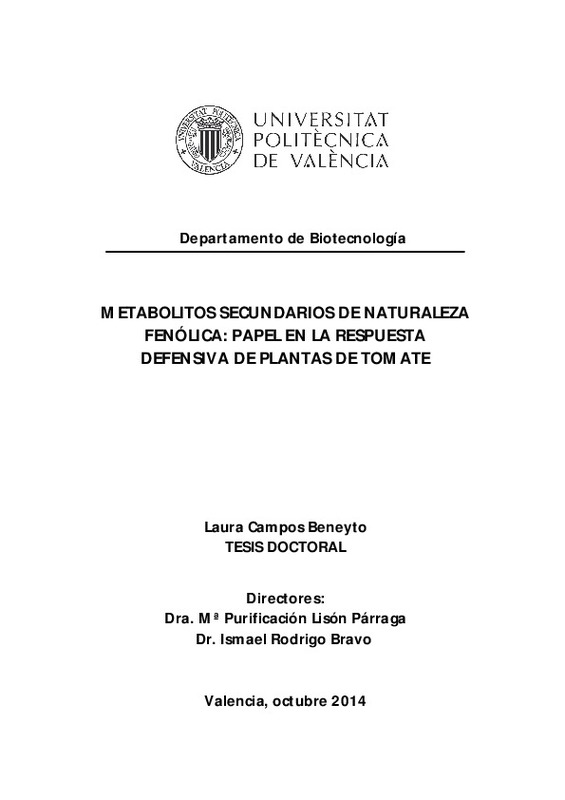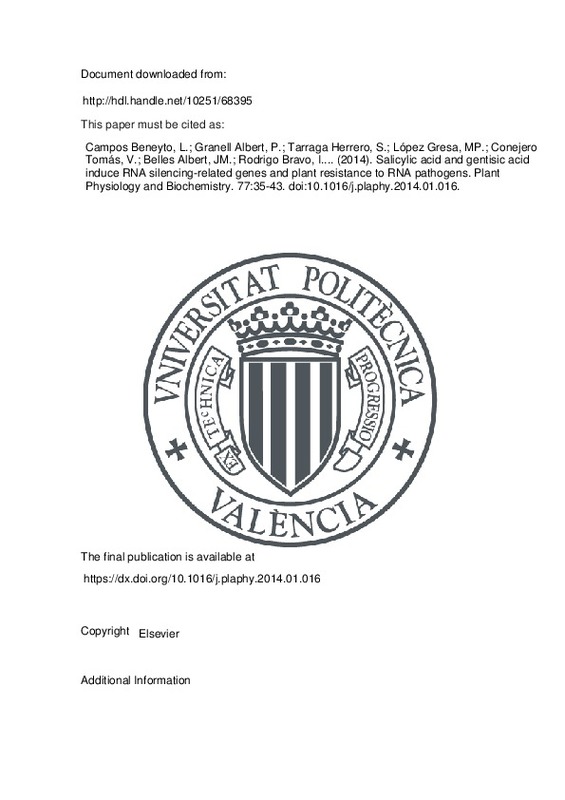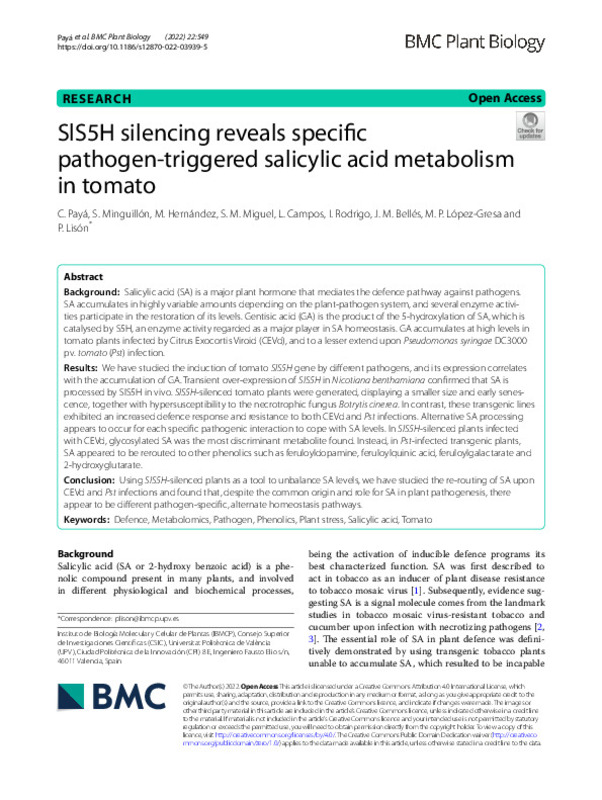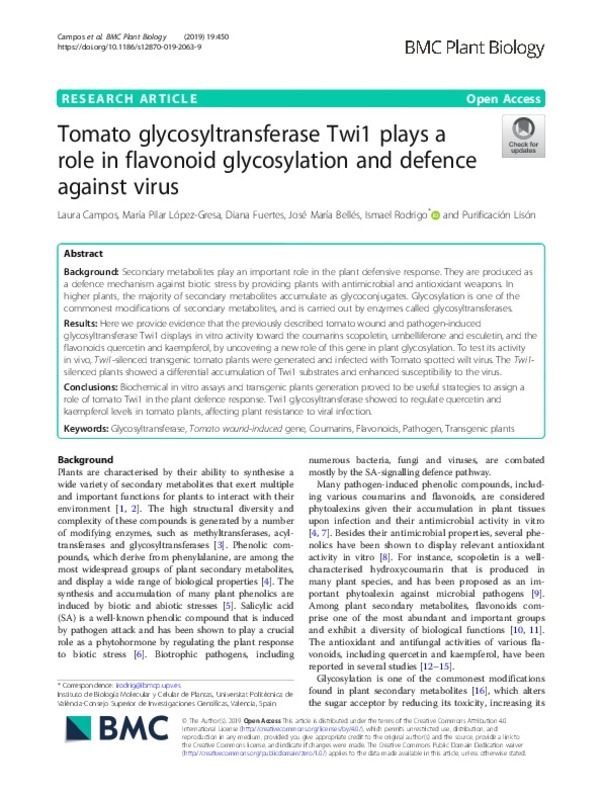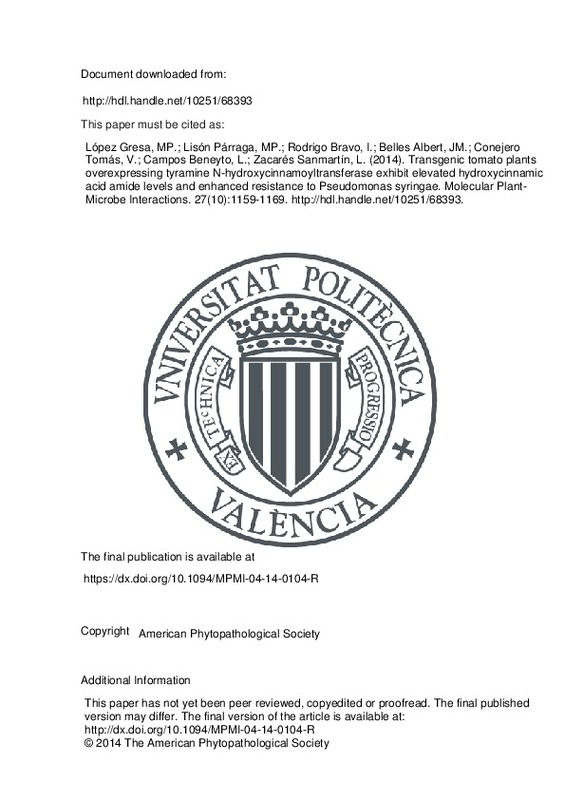

Listar por autor "Campos Beneyto, Laura"
RiuNet: Repositorio Institucional de la Universidad Politécnica de Valencia
- RiuNet repositorio UPV
- :
- Listar por autor
JavaScript is disabled for your browser. Some features of this site may not work without it.
Buscar en RiuNet
Listar
Mi cuenta
Ayuda RiuNet
Admin. UPV
Listar por autor "Campos Beneyto, Laura"
Mostrando ítems 1-12 de 12
-
López-Gresa, María Pilar; Lisón, Purificación; Campos Beneyto, Laura; Rodrigo Bravo, Ismael; Rambla Nebot, Jose Luis; Granell Richart, Antonio; Conejero Tomás, Vicente; Belles Albert, José Mª (Frontiers Media SA, 2017)[EN] Volatile organic compounds (VOCs) emitted by plants are secondary metabolites that mediate the plant interaction with pathogens and herbivores. These compounds may perform direct defensive functions, i. e., acting as ...
-
Lisón Párraga, María Purificación; Tarraga Herrero, Susana; López Gresa, Mª Pilar; Sauri Ferrando, Asunción; Torres Vidal, Cristina; Campos Beneyto, Laura; Belles Albert, José Mª; Conejero Tomás, Vicente; Rodrigo Bravo, Ismael (Wiley-Blackwell, 2013-03)Viroids are single-stranded, circular, noncoding RNAs that infect plants, causing devastating diseases. In this work, we employed 2D DIGE, followed by MS identification, to analyze the response of tomato plants infected ...
-
Fuertes Bailón, Diana (Universitat Politècnica de València, 2017-02-21)Con el fin de hacer frente a ataques patogénicos de diversa naturaleza, las plantas presentan barreras físicas naturales y acumulan compuestos defensivos. Además, han desarrollado una serie de mecanismos inducibles, que ...
-
Cisneros, Adriana E.; Lisón, Purificación; Campos, Laura; López-Tubau, Joan Manel; Altabella, Teresa; Ferrer, Albert; Daròs, José-Antonio; CARBONELL, ALBERTO (Oxford University Press, 2022)[EN] Potato spindle tuber viroid (PSTVd) is a plant pathogen naturally infecting economically important crops such as tomato (Solanum lycopersicum). Here, we aimed to engineer tomato plants highly resistant to PSTVd and ...
-
Campos Beneyto, Laura (Universitat Politècnica de València, 2012-05-11)El ácido salicílico (SA) juega un papel fundamental en la respuesta defensiva de las plantas. Este compuesto se acumula en las mismas como consecuencia de interacciones patogénicas incompatibles y su aplicación exógena ...
-
López Gresa, Mª Pilar; Torres Vidal, Cristina; Campos Beneyto, Laura; Lisón Párraga, María Purificación; Rodrigo Bravo, Ismael; Belles Albert, José Mª; Conejero Tomás, Vicente (Elsevier, 2011-12)[EN] In the present work, we aimed to define the chemical nature of the phenylpropanoids induced during the interaction of the tomato plant. cultivar Rutgers, with the bacterial pathogen Pseudomonas syringae pv. tomato. ...
-
Pérez, J.; Minguillón, Samuel; Kabbas-Piñango, Elías; Payá, Celia; Campos, Laura; RODRIGUEZ-CONCEPCION, Manuel; Espinosa-Ruiz, Ana; Rodrigo Bravo, Ismael; Belles Albert, José Mª; López-Gresa, María Pilar; Lisón, Purificación (American Society of Plant Biologists, 2024-04-15)[EN] Hydroxylated monoterpenes (HMTPs) are differentially emitted by tomato (Solanum lycopersicum) plants resisting bacterial infection. We have studied the defensive role of these volatiles in the tomato response to ...
-
Campos Beneyto, Laura (Universitat Politècnica de València, 2014-11-17)El ácido salicílico (SA) juega un papel fundamental en la respuesta defensiva de las plantas. Este compuesto se acumula en las mismas como consecuencia de infecciones patogénicas de tipo incompatible, y su aplicación exógena ...
-
Campos Beneyto, Laura; Granell Albert, Pablo; Tarraga Herrero, Susana; López Gresa, Mª Pilar; Conejero Tomás, Vicente; Belles Albert, José Mª; Rodrigo Bravo, Ismael; Lisón Párraga, María Purificación (Elsevier, 2014-04)[EN] We have observed that treatments with salicylic acid (SA) or gentisic acid (GA) induced resistance to RNA pathogens such as ToMV and CEVd in tomato and Gynura auriantiaca, respectively. Accumulation of SA and GA has ...
-
Payá C.; Minguillón, S.; Hernández, M.; Miguel, S.M.; Campos, L.; Rodrigo Bravo, Ismael; Belles Albert, José Mª; López-Gresa, María Pilar; Lisón, Purificación (Springer (Biomed Central Ltd.), 2022-11-29)[EN] Background Salicylic acid (SA) is a major plant hormone that mediates the defence pathway against pathogens. SA accumulates in highly variable amounts depending on the plant-pathogen system, and several enzyme activities ...
-
Campos Beneyto, Laura; López-Gresa, María Pilar; Fuertes, Diana; Belles Albert, José Mª; Rodrigo Bravo, Ismael; Lisón, Purificación (Springer (Biomed Central Ltd.), 2019-10-26)[EN] Background: Secondary metabolites play an important role in the plant defensive response. They are produced as a defence mechanism against biotic stress by providing plants with antimicrobial and antioxidant weapons. ...
-
Campos Beneyto, Laura; Lisón Párraga, María Purificación; López Gresa, Mª Pilar; Rodrigo Bravo, Ismael; Zacarés Sanmartín, Laura; Conejero Tomás, Vicente; Belles Albert, José Mª (American Phytopathological Society, 2014-10)[EN] Hydroxycinnamic acid amides (HCAA) are secondary metabolites involved in plant development and defense that have been widely reported throughout the plant kingdom. These phenolics show antioxidant, antiviral, ...
Mostrando ítems 1-12 de 12

Universitat Politècnica de València. Unidad de Documentación Científica de la Biblioteca (+34) 96 387 70 85 · RiuNet@bib.upv.es


